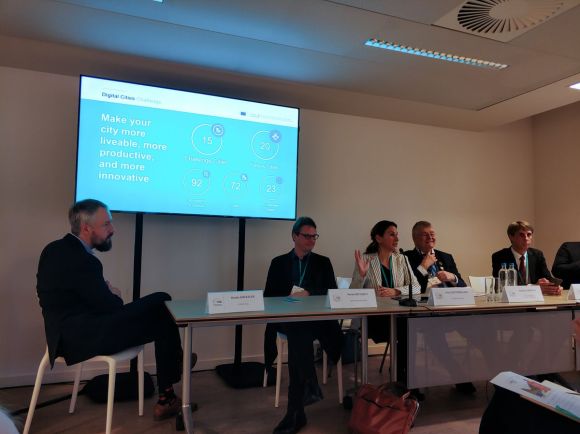
A surge in global population and a sense of imminent environmental confrontation have spurred a search for the ultimate techno-eco-utopia, a city fit to face the challenges of the 21st century. The need for a new metropolitan model is clear.
The United Nations predicts that by 2020, 2.5 billion more people will live in urban areas. This rapid urbanization is putting pressure on cities’ energy systems, transportation, housing and infrastructure. Along with the impending challenges of climate change, environmental pollution, employment, migration and social inequality, metropolitan governments are desperate to utilize the digital potential. It's becoming more livable, efficient and innovative for the benefit of its inhabitants and business.
As a response, the European Commission kicked-off the Digital Cities Challenge at the beginning of 2018. From the industrial Pori on the west coast of Finland to port-oriented Algeciras in the extreme south of Spain, 15 mid-sized cities across the continent took decisions. They decided to try and use the full advantage of the fourth industrial revolution with the help of 6 of Europe’s pioneering smart cities, such as Hamburg, Amsterdam and Eespo. Additionally, 19 fellow cities also decided to join the challenge.
The new green vision as a part of the smart equation
While smart cities have been proliferating around the globe for some years now, this time it wasn’t all about digital stardust. “A lot of times when we talk about data-driven cities we only focus on technology and business opportunities, but cities should also be about social inclusion, climate resilience, living conditions and citizen well-being and safety,” highlighted Martin Krekeler of HafenCity University in Hamburg. It is one of the mentoring cities, that uniquely decided to implement the city’s port into the digital transformation. What sets the new European approach apart, is the commitment to include the new green vision in the smart equation (The European Green Deal being one of the goals emphasized by the von der Leyen Commission.).Once again, a lesson can be learned from the city of Hamburg, illustrating how the answer to modern problems can be based on natural solutions, such as green infrastructure, roofs and facades.
However, cross-city collaboration was not the only collaboration Commission had in mind when initiating the challenge. The other side of its ambitious vision is rooted in collaboration of all stakeholders of the city’s economy. “We did not want to work with city administration alone, because we realized they do not have all the means. By analyzing the success stories we agreed that the best approach is bringing start-ups and other enterprises, universities and other local stakeholders together to co-create a strategy” explained Dana Eleftheriadou, head of Advanced Technologies team at DG GROW.
So far, the decision seems to have paid off. “Applying for the challenge was the first time we [stakeholders] created together in order to transform the city,” said Enrico Fiorentin, Policy Officer at the City of Padova. Out of all the projects, such as metro minuto, subsidies for electric bikes and free wifi in the city center, a smartphone app for citizens to submit their requests. Also, complaints and suggestions have had one of the more head-on impacts on residents’ lives. In an area populated by almost 200,000 citizens, the municipality receives between 3,000 and 4,000 comments per month and issues are resolved more quickly.
Giving away the digital key to the city?
As for right now, collaboration is perhaps the most viable alternative path to digitalization for cities that are not keen on “donating” their citizen’s data to the big tech companies, says Martin Brynskov form Open & Agile Smart Cities. This is a non-profit network of more than 140 smart cities network that promotes minimal solutions for the transition to a digital ecosystem that can work in almost any of the diverse European urban environments. “Even as a city with 20,000 inhabitants, you don’t have to go to big tech companies and accept their offers, you don’t have to give away the digital key to the city” he said. While the tech titans might provide quickly-implementable smart cities solutions, human-rights organizations have been warning that technology companies such as Google cannot be trusted to safely manage the data they collect on residents.
The pioneering intelligent cities still face challenges – big data and privacy being just two of the big elephants in the room. By the end of the year, the 100 Intelligent Cities Challenge is taking the torch as the next step in the search for the ultimate digital eco-utopia, hoping to support at least 100 cities in the efforts to improve the quality of life.
Klara Avsec (Ljubljana, Slovenia)



